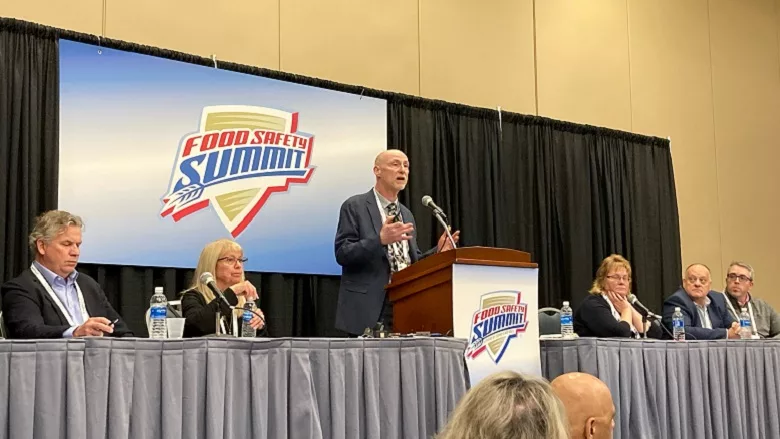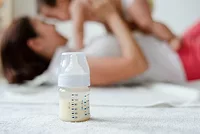FSS '24: Regulatory, Industry Experts Share Best Practices Around FSMA 204 and Traceability Efforts

A Tuesday afternoon workshop at the 2024 Food Safety Summit examined traceability programs and how companies can utilize them to comply with the U.S. Food and Drug Administration's (FDA's) Final Food Traceability Rule under the Food Safety Modernization Act (FSMA) Section 204. The session, sponsored by SafetyChain, was also livestreamed for online attendees to watch in real time.
The workshop featured (in alphabetical order by surname) panelists Patrick Guzzle (second from right, above), Vice President of Food Science and Industry for the National Restaurant Association; Tim Jackson, Ph.D., Senior Science Advisor at FDA; Andy Kennedy, Co-Founder of New Era Partners; Michael Lookup (far right, above), Traceability Lead for Wegmans Food Markets; Drew McDonald (far left, above), Vice President of Quality and Food Safety for Taylor Farms; Kathleen O'Donnell (second from left, above), Chief Scientist of Wegmans Food Markets; Christopher Waldrop, M.P.H. (at podium, above), Senior Health Scientist at FDA's Center for Food Safety and Applied Nutrition (CFSAN); and Rosalind Zils (third from right, above), Vice President and Head of Global Quality Nutrition for Reckitt.
Traceability programs are an important component of food safety and quality programs. The design and management of these programs has represented challenges and opportunities for companies across the supply chain. The Food Traceability Rule, released in November 2022, introduces regulatory traceability requirements for a range of food products. As the implementation date of January 2026 approaches, companies are identifying needed modifications to their traceability programs and asking questions on compliance to the rule.
Panel Discussion
The panel of regulatory and industry experts shared their insights into the implementation of the rule, discussed the challenges companies are facing as they prepare for the rule, and offered actionable solutions for achieving compliance.
Michael Lookup, who leads the traceability strategy for Wegmans, recommends "focusing on simple, practical, repeatable solutions for traceability." Patrick Guzzle noted that many restaurant operators are wondering how the Traceability Rule applies to them when foodservice operations are traditionally not under FDA jurisdiction. Rosalind Zils spoke about the foods listed on FDA's Food Traceability List and how more foods than just those listed will need to be tracked. Drew McDonald explained that the Traceability Rule borrowed many of its concepts from the Produce Traceability Initiative. Andy Kennedy urged attendees to actually read and understand the Traceability Rule, and noted that New Era Partners has created a shortened version of the rule with key points to help companies understand and comply.
Breaking Down FSMA 204
Christopher Waldrop then took some time to break down the contents of FSMA 204 and why the rule is needed, sharing examples from FDA outbreak investigations where incomplete and inconsistent paper trails complicated the investigation and the agency's ability to issue recalls and protect public health. The availability of product lot codes has been key in solving previous outbreak investigations, Waldrop added.
FDA plans to update the Food Traceability list roughly once every five years, after soliciting and considering public comments, Waldrop noted. The point of the Traceability Rule is to identify the most important information for tracking foods along the supply chain—also known as Critical Tracking Events (CTEs) and Key Data Elements (KDEs). Additionally, the movement of foods by lot code will help avoid overly broad recalls by requiring food companies to assign and record traceability lot codes (TLCs) for products when they are shipped and received, or if the products are altered or changed. Records, which can be electronic or paper, must be kept for two years and must be supplied to FDA within 24 hours, upon request, in the form of a sortable spreadsheet.
Looking for quick answers on food safety topics?
Try Ask FSM, our new smart AI search tool.
Ask FSM →
The Traceability Rule compliance date for all firms is January 26, 2026; however, routine inspections under FSMA 204 will not begin until 2027, Waldrop explained, which will give companies time to ensure that all of their suppliers are in compliance.
Progress on Traceability
An extended Q&A session followed the panelists' introductions, giving attendees the opportunity to pose questions on Traceability Rule compliance, programs, and solutions, as well as hear their views on the progress that is being achieved in industry traceability efforts.
Andy Kennedy said that he has seen significant progress following the 2006 E. coli outbreak in spinach that prompted digital tracking of produce and provided the impetus for the launch of the Produce Traceability Initiative in 2008. Traceability technology has evolved to the point that tracking batches and lots is cost-feasible; however, he noted that there are no "no-cost" solutions.
Waldrop said that FDA has not specified how companies need to assign TLCs, in order to give companies some freedom in the process, while Zils recommended that companies keep TLCs as simple as possible within their systems.
Working with Suppliers
Another attendee question concerned how to limit variability in the standards communicated to suppliers in order to eliminate extra work. "At the end of the day, we're hoping that traceability standards will be established that will simplify the work for our suppliers," Lookup said. He also emphasized the importance of easy adoptability for traceability programs.
Zils mentioned that suppliers' unique attributes should be taken into consideration. She also recommended, "Make sure your records are accurate, and make sure to pressure-test the system" so that you can ensure that it works. "It's all about the collaboration," Zils said.
Waldrop also noted that collaboration and assistance from industry will be needed to ensure that foreign suppliers are providing the correct information to U.S. companies so that they can comply with FSMA 204. This includes the requirement for records being provided in English, Kennedy added.
Pilot Project Learnings
Lookup spoke about the learnings gained from conducting multiple traceability pilot projects. Wegmans has taken small-scale scenarios and then considered what they might look like and what they would require at a larger scale. For example, a company way want to look at a traceability pilot project for receiving. It can be carried out with internal resources as an informative exercise that does not require huge effort, cost, or time, Lookup said.
Kennedy noted that, in his discussions with shipping and receiving, he has been surprised to hear that shipping and receiving personnel often do not trust the advance shipping notices (ASNs) they receive, and instead rely on physical inspections of product to ensure that shipments are in order. "Talk to the people who are actually doing the job and have the experience in the field," Kennedy urged.
Missed the Workshop? Watch it On-Demand!
If you missed the Traceability Workshop, you can still catch the on-demand version of the livestream here: Register to watch on-demand.
The 2024 Food Safety Summit is taking place at the Donald E. Stephens Convention Center in Rosemont, Illinois from May 6–9.









